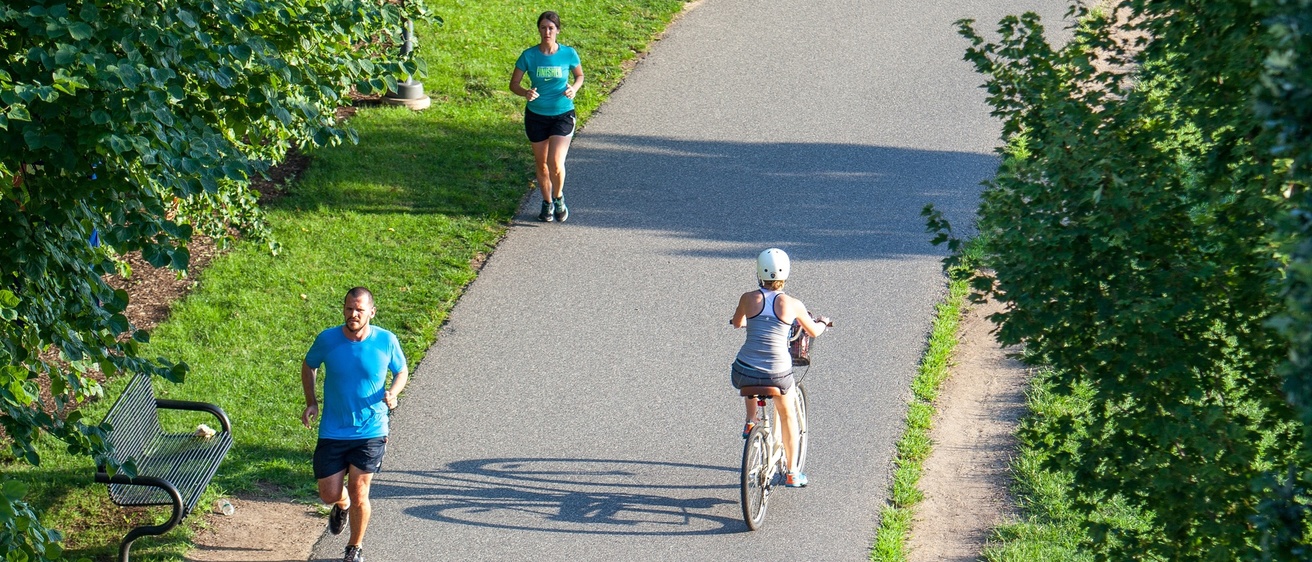I am about to tell you something you probably already know: Exercise is good for your mental health.
You have likely heard it before, and you might even believe it to be true. Whether you have been an avid exerciser for years, currently exercise, or have exercised in the past, your body rewarded you with the hormones that improve your sense of well-being and mood.
Research proves that exercise increases the “feel good” hormones and neurotransmitters called endorphins. The extensive list of positive outcomes that your mind and body receive from exercising still has not convinced most people to adopt the goal of achieving a fit and strong body. Nor have they taken the positive impact of fitness on mental health serious enough to propel them to exercise.
Why is this? As a fitness professional and personal trainer at the University of Iowa, this is something I ponder often. The mission of the personal training program at Iowa is to “get people to enjoy the benefits of having a fully functional, strong and healthy mind and body.” Our campus team is dedicated to educating, coaching, and empowering others to be physically active so that you can be your best selves in all that you do. As the assistant director of fitness and wellness, I am blessed to work at an institution that encourages self-care.
In honor of President Barbara Wilson’s addition of holistic well-being to the priority list of the University of Iowa’s Strategic Plan 2022–2027, I would like to share with you some ways that fitness can help boost your mental health.
- Self-esteem has a direct effect on your mental health. When we meet or exceed our goals, whether that is a weightlifting goal, completing a 5K, nailing a specific pose in yoga, or even a weight loss goal, achieving what you set out to accomplish is an amazing way to boost your self-esteem. Improving your fitness level can give you a more positive outlook on life, improved body perception, and give you an enhanced feeling of physical competence, all of which can lead to you feeling more confident and increasing your self-esteem. Do you have a goal that you are working toward in 2023? If so, do not keep it to yourself! Write it down and consider sharing it with a friend that will help keep you motivated. Not sure who to share it with? I would be happy to hear all about it and if my team can help support you. Lifting others up is my favorite thing to do! (You can find me at: angela-charsha@uiowa.edu).
- Your brain is a powerful and remarkably interesting organ. When and how it works when you start exercising and performing different movements or exercise techniques improves your brain function. Yes, weightlifting can not only get you stronger muscles, but it has the capacity to improve your overall cognition and mental sharpness. Can improving your fitness level actually help you gain strength, feel better physically, and get smarter? Research says yes! If you are new to exercising and don’t know where to start, let my team help you: https://recserv.uiowa.edu/personal-training.
- Connection to other people—actual human connection that brings you into a room with others—is an important part of positive mental health. Your workout time, whether it is exercising individually but in the company of others or joining a group exercise class are two ways to connect with others or find a new community. Both options can provide an opportunity to immediately boost your mental health. Check out our world-class Campus Recreation and Wellness Center: (https://recserv.uiowa.edu/campus-recreation-wellness-center) or view the group exercise class schedule (https://recserv.uiowa.edu/groupfit)
- Exercise can enhance your quality of sleep. Sleep is essential for your brain to recharge. Exercise improves your fitness and helps you sleep, and sleep is a vital component of positive mental health. It is the best of both worlds. Your UI Wellness team even offers free presentations for your team on “Why Sleep Matters” (https://hr.uiowa.edu/employee-well-being/ui-employee-assistance-program/presentation-topics)
In my role, people often mistakenly assume that I have never struggled with being a beginning exerciser or with fitting exercise into my day, both being false assumptions. It was not until my own mother had a serious health event while I was in college that I decided exercise was important. Also, in facing the grief of losing my only sibling at the age of 25, I quickly realized that physical activity was beneficial for my own mental health. Sometimes the universe uses hard lessons to teach us to live differently.
The fitness world moves at a rapid pace and daily, I am always a beginner at one exercise modality or another. There is something for me to learn every day to stay up to date. I am also the mother of two busy children, which allows for exercise to happen only in specific windows of time. Whatever barrier you face as it relates to prioritizing your own fitness, I am confident you can overcome it. I would like for you to ask yourself if what you are doing today is getting you closer to where you want to be tomorrow. Being a beginning exerciser can be overwhelming and is often a very vulnerable position to be in. My team believes vulnerability is beautiful and brave. Please visit with us if you are uncertain where to start or need some extra motivation.
You matter and your mental health matters. The University of Iowa has numerous resources and professionals to help guide you. Below is a brief list of campus partners to support you and your goals as they relate to your mental and physical health. I often remind my students and staff members of this simple quote by Sean Patrick Flanery, “Do something today that your future self will thank you for.”
https://recserv.uiowa.edu/personal-training
https://hr.uiowa.edu/employee-well-being/livewell
https://studentlife.uiowa.edu/departments/student-wellness/
Cover image by James Lewis.
